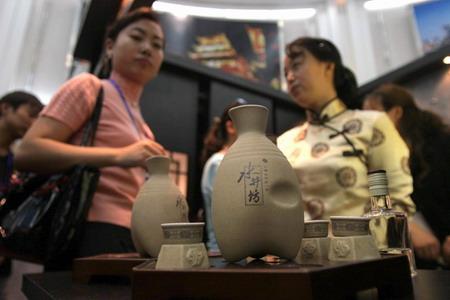
Shuijingfang spirits on display at an exhibition in Shanghai. About 2,000 tons of the premium spirit are produced every year. [Photo / China Daily]
Drinks giant increases its influence over spirit maker Shuijingfang
SHANGHAI - The London-based spirit-making giant Diageo Highland Holding BV (Diageo) has received Chinese regulators' approval to acquire an additional 4 percent stake in Sichuan Chengdu Quanxing Group Co Ltd, hugely increasing its influence over the listed liquor producer Sichuan Shuijingfang Co, Ltd (Shuijingfang).
Diageo will spend some 140 million yuan ($21.63 million) for a 4 percent holding in Quanxing, which will result in Diageo owning a 53 percent stake in the Chinese company. It is also seeking approval from the regulator to launch a mandatory tender offer to acquire the remaining 47 percent of the shares. A minimum of 21.45 yuan a share will be paid for the outstanding shares.
To support Quanxing's development, Diageo will help it raise some 2 billion yuan to expand its operating business.
Quanxing was the largest shareholder of the Shanghai-listed Shuijingfang before the acquisition.
"We are thrilled with the opportunity we have been given to increase our investment in Shuijingfang and to deepen our partnership with the Quanxing Group. I am confident that we have chosen the best possible partner in super-premium Chinese spirits and look forward to working with them as we grow our position in this exciting category," said Gilbert Ghostine, president of Diageo Asia Pacific.
This is the third time Diageo will increase its stake in Quanxing. Diageo acquired a 43 percent share from Quanxing in 2006 and increased its stake to 49 percent in 2008.
Industry experts said the deal will allow Shuijingfang-branded spirits to expand in the overseas market and broaden its distribution channel.
"The strong capital capability, advanced management experience and strong presence in the overseas market mean Diageo can facilitate Shuijingfang's development," said Zhou Siran, an analyst from China Investment Consulting Industry Research Center.
Diageo has introduced Shuijingfang in duty-free shops in the United States, South Korea and elsewhere in recent years, according to media reports.
Lu Haiqing, spokesman for Diageo, said exports accounted for 10 percent of Shuijingfang's sales volume in 2010.
Its annual production is about 2,000 tons. Lu said China will remain the spirit maker's main market.
Foreign investors have been keeping a close eye on the booming liquor sector in China in recent years.
Zhou said Chinese liquor giants have expanded by about 30 percent annually in the past few years.
The high bidding prices in auction houses for liquor have also encouraged foreign investors to spare themselves no pains in trying to increase their involvement in the sector.
"Compared with the wine and beer sectors, which have relatively high brand concentration, there will be more business opportunities in liquor sectors," said Tu Dongmei, an analyst from Adfaith Management Consulting Inc.
Chinese liquor companies are also willing to enter partnerships with foreign companies to increase their presence in the international market. Anhui Kouzi Distillery Co Ltd, a privately owned spirits company, sold a 25 percent stake to Goldman Sachs Group in 2008 for 355 million yuan. Sweden-based V&S Vin&Sprit AB has also formed a joint venture with Sichuan Jiannanchun Group to explore the liquor market.
Even so, industry experts warned that Chinese spirit makers should be cautious in dealing with foreign investors, especially in protecting commercial secrets, a vital concern for a liquor company.
"It may result in a huge loss for the liquor industry if those traditional spirit making skills are fully absorbed by foreign companies," Zhou said.





